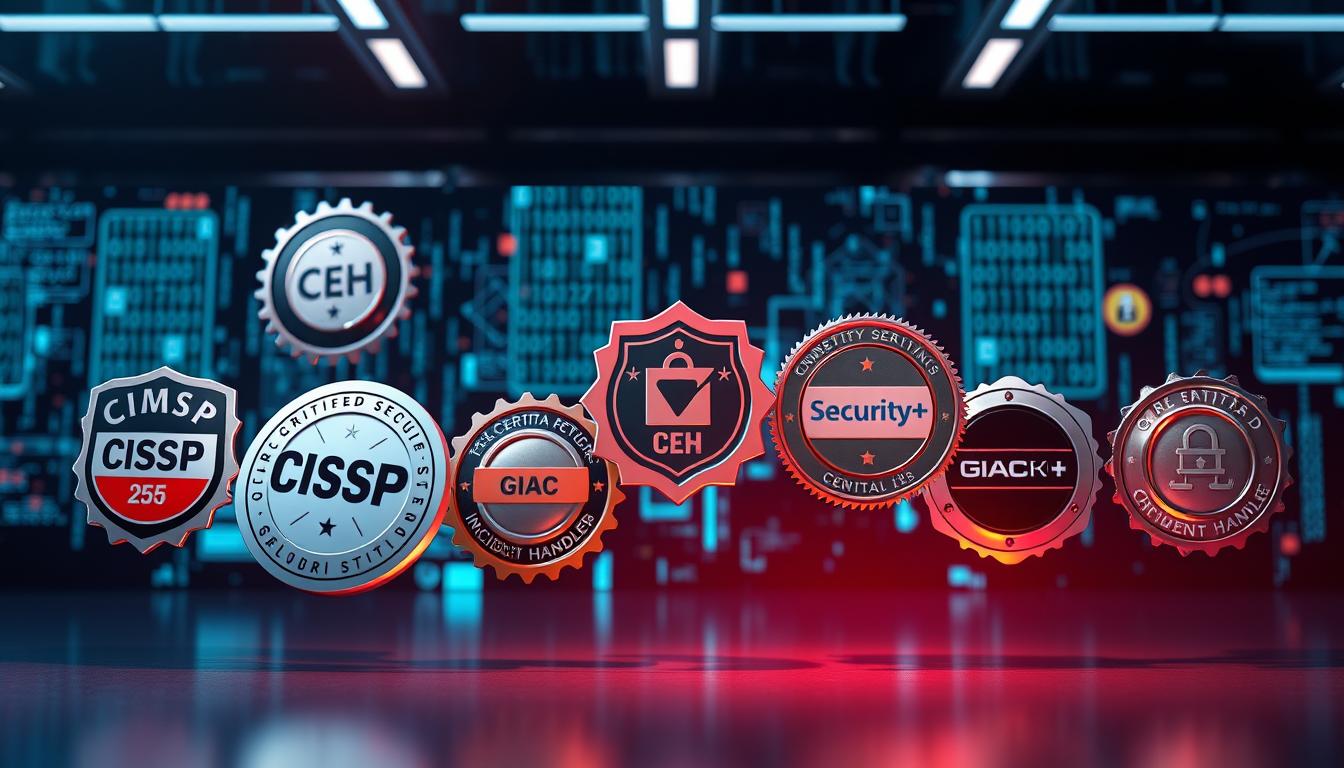Cybersecurity jobs are expected to grow by 32 percent between 2022 and 2032, making it an excellent time to transition into this field. As technology advances, the demand for skilled security professionals is on the rise.
In today’s rapidly evolving digital landscape, cybersecurity has become a critical priority for organizations of all sizes. Advanced certifications have become essential credentials that validate your expertise and can significantly accelerate your career progression.
By obtaining the right certifications, you can enhance your skills and knowledge, opening doors to specialized roles with higher compensation.
Key Takeaways
- Boost your career with advanced cybersecurity certifications.
- Validate your expertise and enhance your market value.
- Discover certifications that align with different career paths.
- Learn about specific certification requirements.
- Unlock specialized roles with higher compensation.
The growing importance of cybersecurity certifications in your career advancement
As cybersecurity threats continue to evolve, the importance of certifications in advancing your career cannot be overstated. According to the 2024 State of Cybersecurity report by CompTIA, the highest percentage of professionals joining Cyber Security teams in 2023, 41%, were infrastructure specialists who have been promoted, whilst the second-highest percentage, 35%, are current line of business employees who seek to develop their Cyber Security skills.
The need for high-quality Cyber Security training and certifications is at an all-time high. This shift is driven by the increasing sophistication of threats and regulatory requirements. As a result, cybersecurity certifications have evolved from optional credentials to essential qualifications.
- Cybersecurity certifications serve as objective validation of your technical knowledge and practical skills, giving hiring managers confidence in your abilities to protect critical systems and data.
- Employers now frequently list specific certifications as mandatory requirements in job postings, using them as filtering mechanisms during the hiring process.
- Certified professionals typically command higher salaries, with studies showing that certain advanced certifications can increase your earning potential by 15-25% compared to non-certified peers.
Beyond technical validation, cybersecurity certifications demonstrate your commitment to professional development and staying current with evolving security practices and technologies. As you progress in your career, specialized certifications become particularly valuable for accessing senior roles and leadership positions that require proven expertise.
How to choose the right cybersecurity certification for your career goals
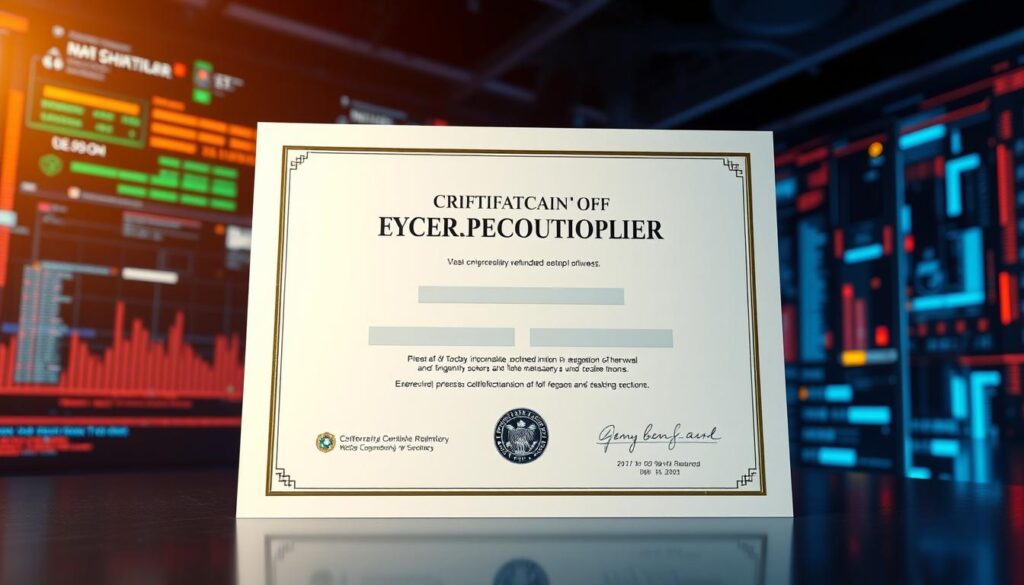
As you navigate your cybersecurity career, identifying the most suitable certification is key to unlocking new opportunities. Your career aspirations and current experience level play a significant role in determining the most appropriate certification.
Assessing your experience level and specialization interests
Begin by evaluating your current work experience and the areas within cybersecurity that interest you the most. Consider whether you’re more inclined towards security management, penetration testing, or compliance. This self-assessment will help narrow down the certifications that are most relevant to your career goals.
For instance, if you’re interested in ethical hacking, you might look into certifications that focus on penetration testing and vulnerability assessment. On the other hand, if you’re more interested in the managerial aspect, a certification that emphasizes cybersecurity management and leadership might be more suitable.
Considering certification requirements, costs, and industry recognition
Once you’ve identified your area of interest, it’s crucial to examine the certification requirements, including any prerequisites such as work experience or educational background. The exam format and content are also important factors to consider.
- Evaluate the financial investment required for the certification, including exam fees, study materials, and training courses.
- Research the certification’s industry recognition and reputation among employers in your target job market.
- Consider the time commitment needed for preparation and the renewal requirements to maintain your credential.
By carefully assessing these factors, you can make an informed decision that aligns with your career objectives and enhances your professional growth in the cybersecurity field.
CompTIA Security+

The CompTIA Security+ certification is a foundational credential that validates your understanding of security concepts and best practices. It’s designed to be a comprehensive certification that covers a wide range of security topics, making it an ideal starting point for those new to cybersecurity or looking to enhance their existing knowledge.
Core Skills Validated and Career Opportunities
The CompTIA Security+ exam (SY0-601) assesses your ability to perform core security functions, including network security, compliance, operational security, and incident response. By obtaining this certification, you demonstrate to employers that you possess the necessary skills to secure networks, identify and mitigate vulnerabilities, and manage risk. This certification can open doors to various career opportunities, such as security administrator, network administrator, and security consultant.
Requirements, Costs, and Preparation Resources
While there are no strict prerequisites for taking the Security+ exam, CompTIA recommends having at least two years of IT administration experience with a security focus and earning your Network+ certification first. The exam costs approximately $404, though prices may vary depending on your location and any available discounts. To prepare, you can utilize official resources like the CompTIA Security+ Study Guide, practice exams, and instructor-led training courses. Many candidates also supplement their study with online practice labs, video courses, and study groups to reinforce their understanding of key concepts.
- CompTIA recommends 2+ years of IT administration experience with a security focus, though there are no mandatory prerequisites.
- The certification exam (SY0-601) costs between $381-$466 USD, depending on location and discounts.
- Your certification is valid for three years and can be renewed through continuing education or by passing the current exam version.
- Official preparation resources include study guides, practice exams, and instructor-led training.
- Many candidates use additional resources like online labs, video courses, and study groups.
ISC2 Certified Information Systems Security Professional (CISSP)

As a gold standard in the cybersecurity industry, the CISSP certification demonstrates a deep understanding of security practices and principles. You will benefit from obtaining this certification as it validates your ability to design, implement, and manage a best-in-class cybersecurity program.
Why CISSP is Highly Sought-After in the Industry
The CISSP certification is highly regarded because it covers a broad spectrum of security topics, including Security and Risk Management, Asset Security, and Security Architecture and Engineering. This comprehensive coverage ensures that CISSP holders possess a wide range of skills that are essential for protecting organizations against evolving cyber threats.
By achieving CISSP certification, you demonstrate your expertise in critical areas such as identity and access management, security assessment, and software development security. This expertise is crucial for organizations seeking to bolster their cybersecurity posture.
Experience Requirements and Career Advancement Opportunities
To qualify for the CISSP certification, you must have a minimum of five years of cumulative, paid work experience in at least two of the eight CISSP domains. Candidates with a four-year degree can substitute one year of the experience requirement.
- To qualify for CISSP certification, you must have a minimum of five years of cumulative, paid work experience in at least two of the eight CISSP domains.
- Candidates with a four-year degree can substitute one year of the experience requirement, while those with approved certifications can substitute additional experience.
- If you pass the exam but lack the required experience, you can become an Associate of (ISC)² while you accumulate the necessary professional background.
- CISSP certification can accelerate your advancement to roles such as Security Architect, Security Manager, Director of Security, or Chief Information Security Officer.
- The credential typically correlates with significant salary increases, with CISSP holders often earning 25-30% more than their non-certified counterparts in similar positions.
EC-Council Certified Ethical Hacker (CEH)
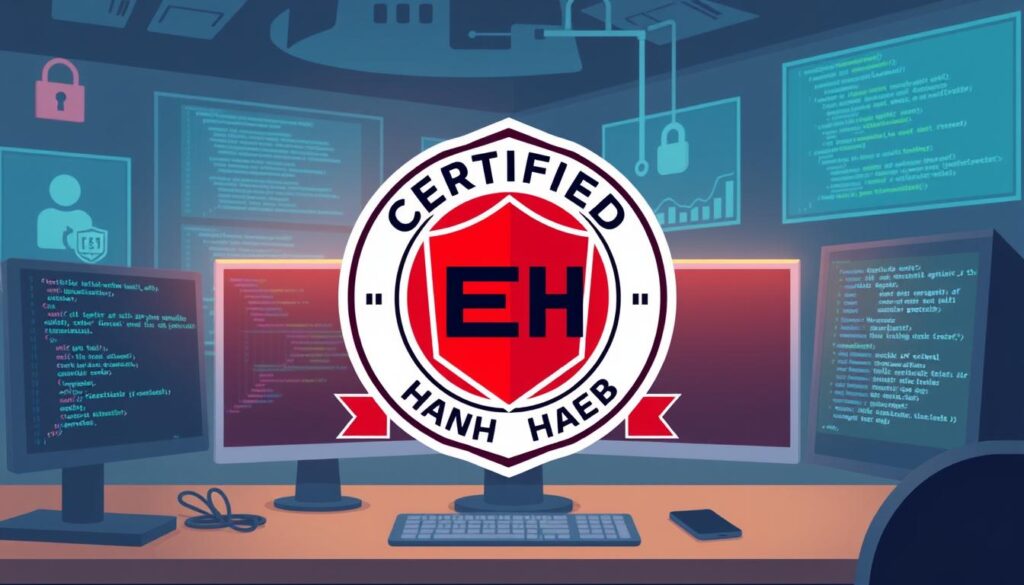
For cybersecurity professionals looking to specialize in penetration testing and ethical hacking, the EC-Council Certified Ethical Hacker (CEH) certification is a valuable asset. This certification demonstrates that you have the skills to identify vulnerabilities and weaknesses in an organization’s security infrastructure.
Skills in Penetration Testing and Ethical Hacking
The CEH certification validates your ability to apply ethical hacking techniques to identify and fix security vulnerabilities. You will learn various penetration testing methodologies and tools used by hackers, enabling you to strengthen your organization’s security posture.
With this certification, you will gain expertise in areas such as network security, cryptography, and threat analysis, making you a valuable asset to any organization seeking to enhance its cybersecurity.
Prerequisites and Job Roles for Certified Ethical Hackers
To qualify for the CEH exam, you need either two years of work experience in information security or completion of an official EC-Council training program. The certification opens doors to specialized security roles such as penetration tester, security analyst, vulnerability assessor, and security consultant.
Many certified ethical hackers work as independent consultants or with specialized security firms, conducting authorized penetration tests for client organizations. The CEH certification is recognized globally and is particularly valued in organizations that maintain compliance with regulations requiring regular security assessments.
ISACA Certified Information Systems Auditor (CISA)

For IT professionals looking to advance their careers in auditing and compliance, the CISA certification is a highly respected credential. The CISA certification, offered by ISACA, is designed to validate your expertise in auditing, control, and assurance of information systems.
Expertise in IT Auditing and Compliance
The CISA certification demonstrates your ability to assess the vulnerabilities and risks associated with IT systems and implement measures to mitigate them. With this certification, you will have the expertise to evaluate the effectiveness of IT controls and provide assurance over IT processes. CISA-certified professionals are equipped with the knowledge to manage and monitor IT compliance, ensuring that organizations adhere to regulatory requirements and industry standards.
Experience Requirements and Career Paths
To qualify for the CISA certification, you need at least five years of experience in IT, information systems auditing, control, security, or assurance. However, substitutions are available for education, allowing you to substitute one or two years of experience with a two or four-year degree, respectively. The certification can lead to specialized career paths in IT audit, compliance management, risk assessment, and governance roles across various industries.
- To qualify for CISA certification, you need five years of professional experience in information systems auditing, control, or security, though substitutions are available for education.
- The certification can lead to specialized career paths in IT audit, compliance management, risk assessment, and governance roles across various industries.
- CISA-certified professionals are particularly sought after by consulting firms, financial institutions, and large enterprises with complex regulatory requirements.
- Many CISA holders advance to senior positions such as IT Audit Manager, Compliance Director, or Chief Audit Executive with corresponding increases in compensation.
- The certification requires maintenance through continuing professional education (CPE) credits, ensuring your knowledge remains current with evolving audit practices and technologies.
The cost for the CISA certification is $575 for ISACA members and $760 for non-members. By obtaining this certification, you can significantly enhance your career prospects and open up new opportunities in the field of IT auditing and compliance.
ISACA Certified Information Security Manager (CISM)
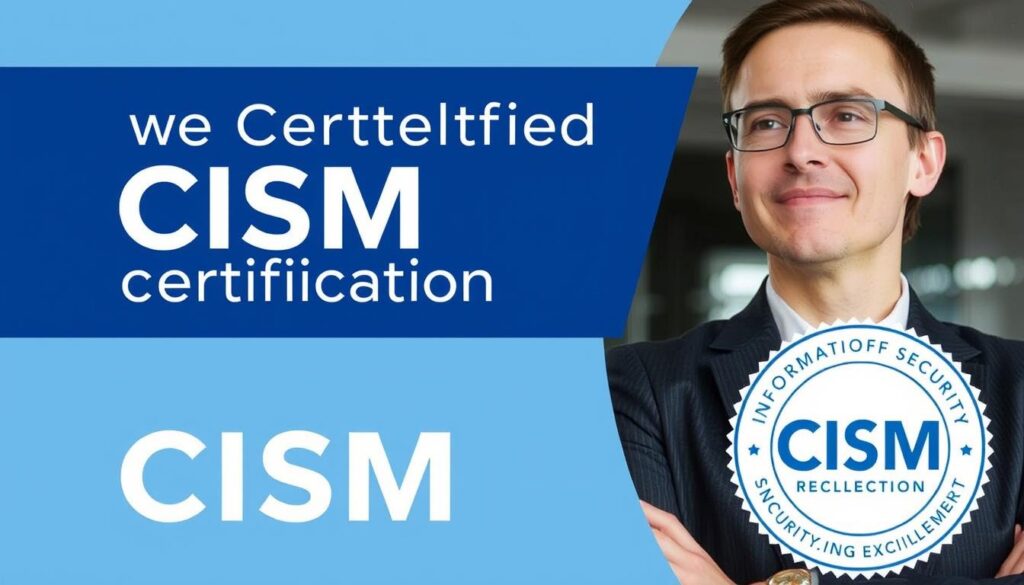
The ISACA Certified Information Security Manager (CISM) certification is a prestigious credential that validates your expertise in managing and governing enterprise information security. This certification is designed for experienced professionals who are looking to advance their careers into senior management roles within the information security domain.
Management-focused security expertise
The CISM certification emphasizes the importance of management-focused security expertise, equipping you with the knowledge and skills necessary to develop and manage an effective information security program. It covers critical areas such as information security governance, risk management, and incident management, ensuring that you are well-versed in the latest best practices and standards.
With CISM, you demonstrate your ability to provide effective information security governance, aligning with business objectives and ensuring the protection of sensitive information. This expertise is highly valued by organizations, as it directly impacts their ability to mitigate risks and maintain compliance with regulatory requirements.
Prerequisites and leadership opportunities
To qualify for the CISM certification, you need at least five years of experience in information security, with at least three years in security management roles. You can satisfy up to two years of this requirement with general information security experience or waive one or two years with another certification in good standing or a graduate degree in an information security-related field.
- To qualify for CISM certification, you need five years of information security experience, with at least three years in security management roles.
- The certification can accelerate your advancement to leadership positions such as Information Security Manager, Security Director, or Chief Information Security Officer.
- CISM-certified professionals typically command higher salaries than their non-certified peers, reflecting the value organizations place on management-level security expertise.
- Many organizations specifically require CISM certification for senior security positions that involve program oversight, budget management, and strategic planning.
- The credential requires ongoing maintenance through continuing professional education, ensuring your management approaches remain aligned with evolving best practices.
ISC2 Certified Cloud Security Professional (CCSP)

The ISC2 Certified Cloud Security Professional (CCSP) certification is a key credential for professionals looking to advance their careers in cloud security. This comprehensive certification covers the skills needed to manage and secure cloud environments, including cloud platform and infrastructure security, cloud security operations, and legal, risk, and compliance.
Cloud Security Specialization Benefits
By obtaining the CCSP certification, you demonstrate your expertise in cloud security, which is highly valued by organizations. This specialization can lead to enhanced career opportunities and higher salaries due to the high demand for skilled cloud security professionals. The certification covers six domains, ensuring you have a broad and deep understanding of cloud security.
Requirements and Career Opportunities in Cloud Security
To qualify for the CCSP certification, you need a minimum of five years of full-time IT experience, including three years in information security and one year in cloud security. This certification can lead to specialized roles such as Cloud Security Architect, Cloud Security Engineer, Cloud Security Consultant, or Cloud Security Manager. CCSP-certified professionals are in high demand, and many organizations require this certification for roles involving the design and implementation of secure cloud architectures.
The CCSP certification requires renewal every three years through continuing professional education, ensuring your cloud security knowledge remains current with rapidly evolving technologies. This commitment to ongoing education not only enhances your skills but also demonstrates your dedication to staying at the forefront of cloud security expertise.
GIAC Certified Incident Handler (GCIH)

Incident response is a critical component of cybersecurity, and the GCIH certification demonstrates expertise in this area. As a cybersecurity professional, having the right certifications can significantly enhance your career prospects.
Incident Response and Handling Capabilities
The GCIH certification is designed for anyone working in incident response, including job titles such as security incident handler, security architect, and systems administrator. This certification validates your ability to handle and respond to security incidents effectively.
Key capabilities include understanding security principles, networking protocols, and the Windows Command Line. These skills are essential for managing and mitigating security threats.
Exam Format and Career Applications
The GCIH exam consists of 106-115 questions to be completed within three hours, with a passing score of 71%. Notably, the exam allows the use of books, notes, and other reference materials, focusing on practical application rather than memorization.
This certification is particularly valuable for roles such as incident responder, SOC analyst, threat hunter, and security operations specialist. Many organizations seek GCIH-certified professionals for their computer security incident response teams (CSIRTs) or security operations centers.
Certification renewal is required every four years through continuing education or retaking the current version of the exam, ensuring that your incident handling knowledge remains current.
ISC2 Systems Security Certified Practitioner (SSCP)
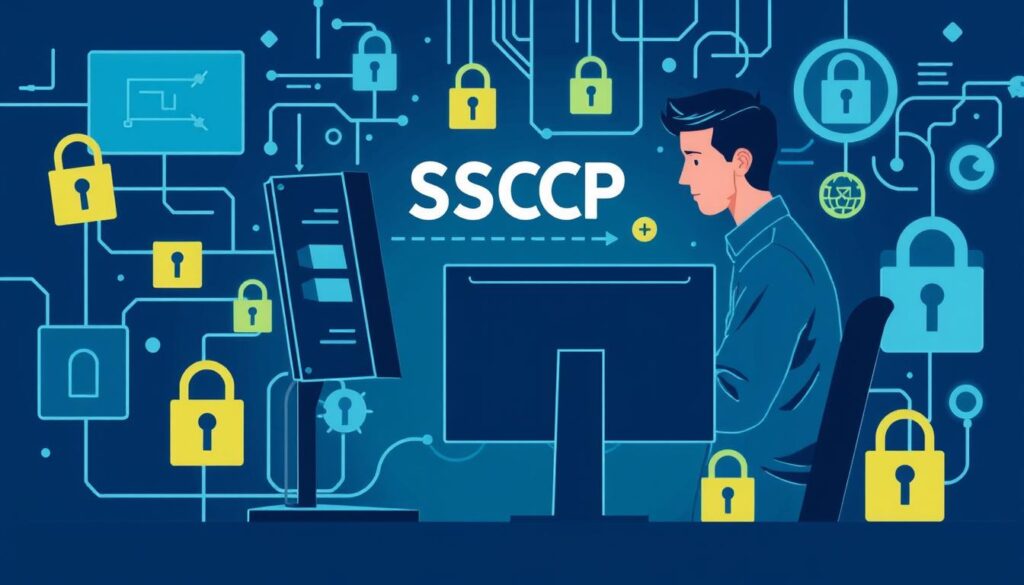
Professionals seeking to demonstrate their hands-on security skills can achieve this through the SSCP certification. The SSCP is designed for IT professionals working hands-on with an organization’s security systems or assets.
Hands-on Security Implementation Skills
The SSCP certification validates your ability to implement and manage security controls, including risk identification and mitigation. It demonstrates that you have the practical skills necessary to secure an organization’s systems and assets.
Requirements and Target Job Roles
To qualify for SSCP certification, you need at least one year of paid work experience in one or more of the seven SSCP domains. Alternatively, a cybersecurity-related degree can satisfy this requirement. The certification is well-suited for roles such as systems administrator, security analyst, network security engineer, and security consultant. SSCP is recognized by the US Department of Defense (DoD) as meeting Directive 8570.01-M requirements, making it valuable for government and contractor positions.
Climbing the cybersecurity ladder: Strategies for certification success

Achieving success in cybersecurity certifications requires a strategic approach. To advance in your career, it’s essential to plan your certification path carefully.
To create a successful strategy, start by developing a certification roadmap that aligns with your career goals. This involves assessing your current skills, identifying areas for improvement, and selecting the most relevant cybersecurity certifications.
Creating a certification roadmap for career growth
Begin by setting realistic goals and breaking down your study material into manageable chunks. Allocate specific time slots for studying, ensuring you stay on track without feeling overwhelmed.
Balancing work, study, and continuing education
To balance work and study effectively, consider leveraging your current work environment as a practical laboratory for applying cybersecurity concepts. Utilize various learning formats, such as video courses and practice labs, to accommodate your learning style and time constraints. Make continuing education a sustainable habit by allocating time each week for professional development, preparing you for the exam and future career steps.
Conclusion
With the ever-changing threat landscape, now is the perfect time to boost your career with advanced cybersecurity certifications. The cybersecurity landscape continues to evolve rapidly, creating unprecedented demand for qualified professionals with validated expertise through respected certifications. Each certification offers unique value depending on your career stage, from foundational credentials to specialized ones like cloud security.
Your certification journey should be strategic and progressive, building on each credential to create a comprehensive portfolio that demonstrates both breadth and depth of security knowledge. By combining certifications with practical experience, you’ll not only increase your market value but also contribute to protecting organizations from evolving threats. This investment can yield significant returns through career advancement, increased compensation, and professional recognition in this dynamic field, making you a competitive analyst for various positions.
